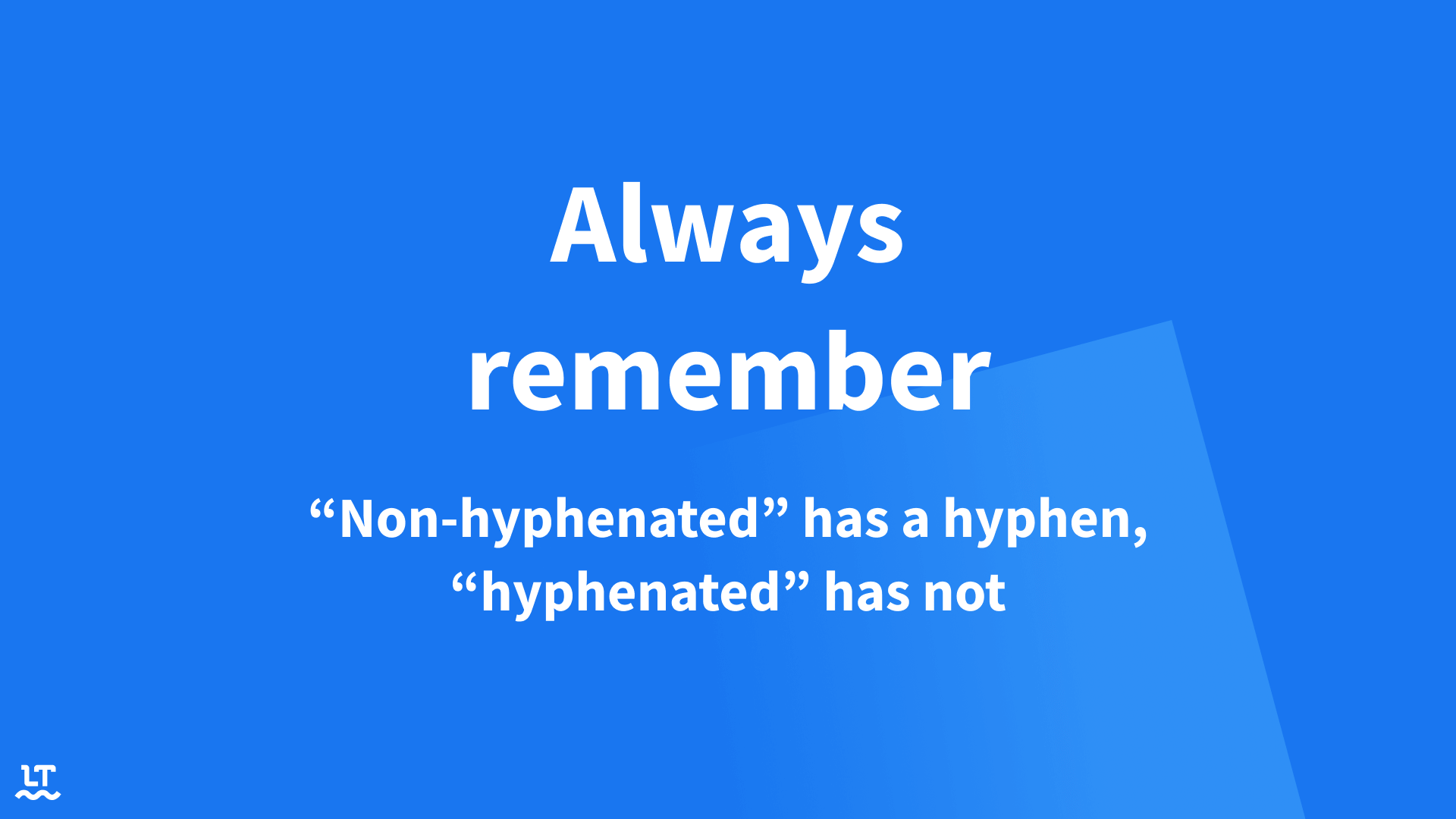The Correct Use of a Hyphen
The Infamous Hyphen
A hyphen—like many other punctuation marks—should help us to navigate between the words and sentences of our texts. Luckily, there are some clearly defined cases that automatically invoke the use of a hyphen. In other examples, a hyphen is not mandatory, but helpful for the readers. Let’s have a look at the distinct instances first.
Basically, hyphenated words can obtain every part of speech in a sentence. It doesn’t matter if you come across a combination of two nouns, one preposition plus an adjective, or a whole phrase working as a modifier.

Hyphenated Numbers and Fractions (Numerals)
Try to remember to hyphenate when spelling out numbers between twenty-one and ninety-nine. Every one of them has a hyphen between the first, and the second digit. Fractions and ordinal numbers require a hyphen, too.
Thirty-one plus forty-five equals seventy-six.
You’ll need two-thirds of Parliament.
He was second-best.
We have to write a one-hundred-words essay until Thursday.
Compound Adjectives with Hyphens
Whenever you encounter an adjective that consists of two parts (an adverb + an adjective, or two adjectives), its spelling primarily depends on the position of this construction. Compare these two sentences:
Compare
George Orwell was a well-known author.
George Orwell was well known for his novels.
If the adjective comes right before a noun, it becomes hyphenated in order to avoid possible confusion. If, on the other hand, the two-part adjective stands alone, it doesn’t have a hyphen. This distinction refers to so-called attributive and predicative adjectives.
Prefixes that indicate this hyphenated construction:“well-”, “ill-”, “little-”, or “much-”
Whenever you want to use two proper adjectives simultaneously, a hyphen is needed for this parallelism:
My new jacket is blue-green at the bottom, and light-blue on top.
That’s not the case if adjectives are specified through a preceding noun:
I brought you some salmon pink flowers.
Kindly note that some people tend to put the hyphen arbitrarily.
I brought you some salmon-pink flowers.
Compound Nouns with and without Hyphens
Look out for prefixes like “pre-”, “pro-”, “anti-”, “non-”, “post-”, “ex-”, “half-”, “self-”, “all-”, “full-”, “part-”, “mid-”, “high-”, and “low-”.
These nearly always come separated from the noun by a hyphen:
The high-season of this region is between mid-September and mid-November.
One part of this two-tier construction may also be a digit, a special character or a single letter:
She gave us a boring 45-minute speech about physics.
I wouldn’t wear this t-shirt.
You have big $-signs in your eyes.
(Please note: This is usually informal.)
Some compound words appear in their hyphenated form in order to distinguish them from other similar words.
Mother-in-law, drive-in, walk-through, real-time, mayor-elect, editor-in-chief.
Other compound words you’ll never find with a hyphen:
Life insurance, real estate, lifestyle, doorbell, setup.
Hyphenated Phrases With More Than One Hyphen
Whenever you want to use a modifier that consists of more than two components, we suggest using more than one hyphen. Just connect every single word with its neighbors, and you’re good to go. Remember: you can identify these cases by simply omitting one component. If it only makes sense with it, you want to indicate this conjunction by hyphens.
Out-of-place
dog-eat-dog
up-to-date
know-it-all
Hyphenating Verbs Modifies Their Meaning
It’s not very common, but there are a few examples with hyphenated verbs. These may occur in only one specific combination or in various forms, such as verbs beginning in “double-.”
double-click
fact-check
roller-skate
drop-ship
Hyphens in Names and Brands
If a popular brand name, a company, or even a personal name gets a hyphen depends on the specific case. There is no valid rule for this category. However, don’t forget to capitalize all components (as geographical terms appear in uppercase).
Coca-Cola, 7-Eleven, Harley-Davidson, Rolls-Royce
Saint-Tropez, Jay-Z, Miami-Dade
Non-Mandatory Use of the Hyphen
The following cases show examples of a more or less voluntary use of the hyphen. When you decide to include a hyphen, this generally helps to avoid confusion caused by ambiguity. For compound nouns (such as nationalities), there are a couple of examples that might require a hyphen:
flowerpot or flower pot or flower-pot
Occasionally, a hyphen supports the distinction between two homographs (words with an identical spelling):
After we re-view the movie, we’re able to write a review properly.
Moreover, the exact position of the hyphen determines the meaning of a given sentence.
Please compare
The staff has to work twenty four-hour shifts a week.
The staff has to work twenty-four-hour shifts a week.
Since the rules of English hyphenation appear to be fairly complicated, LanguageTool will provide you with a well-deserved and much-appreciated overview on all the spelling challenges. It’ll remind you of all mandatory hyphens, but only give you some advice on the voluntarily set hyphens. Moreover, don’t worry about mistaking hyphens and dashes—LT helps you also to distinguish them.
| Obligatory Hyphen | Optional Hyphen |
|---|---|
| Numbers (21-99) and fractions | Compound nouns like flower-pot |
| Attributive adjectives with “ill-”, “much-”, “well-” | Distinction of homographs |
| Parallel adjectives like blue-green | Adjectives which are specified by a noun salmon-pink |
| Compound nouns with “pre-”, “pro-”, “anti-”, “non-”, “post-”, “ex-”, “half-”, “self-”, “all-”, “full-”, “part-”, “mid-”, “high-”, and “low-”; with digits, single letter, or special characters. | Distinction between two sentence meanings |
| Some compound nouns like walk-through | |
| Some compound verbs like double-check | |
| Hyphenated names | |
| Modifiers of three or more words |
Last Tip
As you can see, it can be mess to find the correct spelling in English. When it comes to the use of a hyphen, always consider this.
- Would it make a difference if I hyphenate a compound?
- Am I understood if I refuse to put a hyphen?
- Can I even decide on using a hyphen, or do I have to write it as one word (or two)?

